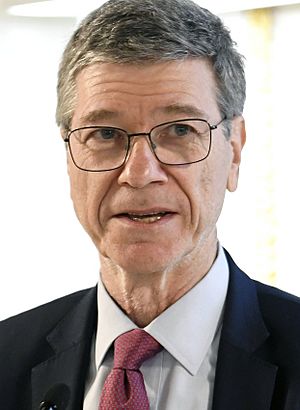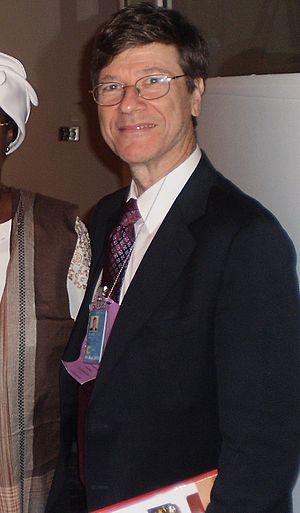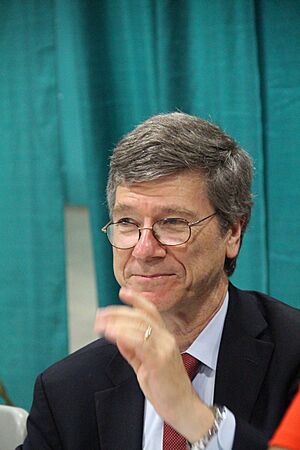Jeffrey Sachs facts for kids
Quick facts for kids
Jeffrey Sachs
|
|
|---|---|

Sachs in 2019
|
|
| Born |
Jeffrey David Sachs
November 5, 1954 Oak Park, Michigan, U.S.
|
| Spouse(s) | Sonia Ehrlich Sachs |
| Institution | Harvard University Columbia University |
| Field |
|
| School or tradition |
Keynesian economics |
| Doctoral advisor |
Martin Feldstein |
| Doctoral students |
|
| Contributions | Millennium Villages Project |
Jeffrey David Sachs (born November 5, 1954) is an American economist and public policy expert. He is a professor at Columbia University. He has worked a lot on topics like sustainable development and how countries can grow their economies.
Sachs leads the Center for Sustainable Development at Columbia University. He is also the president of the UN Sustainable Development Solutions Network. He helps the United Nations (UN) Secretary-General António Guterres with the Sustainable Development Goals (SDGs). These are 17 big goals adopted by the UN in 2015 to make the world better.
From 2001 to 2018, Sachs was a special advisor to the UN Secretary-General. Before that, he advised on the Millennium Development Goals (MDGs). These were eight global goals to reduce extreme poverty, hunger, and disease by 2015. He first became an advisor to the UN Secretary-General in 2002 under Kofi Annan.
Sachs is a co-founder of Millennium Promise Alliance. This group works to end extreme poverty and hunger. He also led the United Nations Millennium Project from 2002 to 2006, which focused on the MDGs. In 2010, he joined the Broadband Commission for Sustainable Development. This group aims to show how important internet is for global policy. Sachs has written many books and received several awards for his work.
Contents
Early Life and Education
Jeffrey Sachs grew up in Oak Park, Michigan, near Detroit. His father, Theodore Sachs, was a lawyer. Jeffrey graduated from Oak Park High School.
He then went to Harvard College, where he earned his first degree in 1976. He continued his studies at Harvard, getting his master's and Ph.D. in economics. While he was still a student, he was invited to join the Harvard Society of Fellows.
Academic Career
Teaching at Harvard University
In 1980, Sachs started teaching at Harvard as an assistant professor. He became an associate professor in 1982. Just one year later, at 28 years old, he became a full professor of economics at Harvard.
For the next 19 years, Sachs held important roles at Harvard. He was the Galen L. Stone Professor of International Trade. He also directed the Harvard Institute for International Development and the Center for International Development at Harvard Kennedy School.
Working at Columbia University
Today, Sachs is a university professor at Columbia University. He leads the Center for Sustainable Development there. From 2002 to 2016, he was the director of the Earth Institute at Columbia University. This organization brings together different fields to solve big problems facing our planet and support sustainable development.
Sachs teaches classes at Columbia's School of International and Public Affairs and the Mailman School of Public Health. He also teaches a course for college students called "Challenges of Sustainable Development."
Helping Countries and Global Development
Jeffrey Sachs has given advice to many countries on how to manage their economies.
Helping Bolivia's Economy
Before the 1985 Bolivian general election, Sachs was asked to advise on an economic plan for Bolivia. Bolivia was facing very high inflation, meaning prices were rising incredibly fast. Sachs suggested a plan to control prices and cut government spending.
His plan was put into action, and inflation in Bolivia quickly became stable. Sachs's ideas helped Bolivia reduce its large debt to international lenders.
Advising Post-Communist Countries
In 1989, Sachs advised the anticommunist Solidarity movement in Poland. He helped create a plan for Poland to change from a government-controlled economy to a market economy. This plan was very important for Poland's economic reforms. Sachs also helped Poland reduce its national debt.
His methods for quickly changing economies became known as "shock therapy." This meant making big economic changes very fast. Poland's economy saw some challenges at first, but prices eventually became stable. Because of his help, Poland gave Sachs one of its highest honors in 1999.
After Poland's success, leaders in the Soviet Union and later Russia also asked for his advice on changing to a market economy.
Working on Global Development
Since his work with post-communist countries, Sachs has focused on global issues. These include economic development, reducing poverty, improving health, and protecting the environment. He has written a lot about climate change, controlling diseases, and globalization. Since 1995, he has worked to help reduce poverty in Africa.
Sachs believes that with better seeds, irrigation, and fertilizer, farmers in Africa can grow much more food. He says this would greatly increase their income and reduce poverty. He also supports setting up microloan programs in poor areas, which help people start small businesses.
He is also a founder of the World Happiness Report, which looks at how happy people are around the world.
The Millennium Villages Project (MVP), which Sachs leads, works in many African countries and helps over 500,000 people. The project aims to show how different types of help can work together to end extreme poverty. While the project has shown some positive results, some people have questioned how its success is measured.
Sachs also helped create The Global Fund to Fight AIDS, Tuberculosis and Malaria. He worked with UN Secretary-General Kofi Annan on this important fund. He also worked with the U.S. government to develop programs to fight HIV/AIDS and malaria. From 2002 to 2006, he led the UN Millennium Project, which created a plan to achieve the MDGs.
As a special advisor at the UN, Sachs has met with many world leaders. He has also worked with famous people like Bono and Angelina Jolie, who traveled to Africa with him to see the Millennium Villages.
In July 2015, during the Greek government-debt crisis, Sachs and other economists wrote an open letter to German Chancellor Angela Merkel. They asked her to rethink her government's strict economic policies for Greece.
Sachs is also one of the founders of the Deep Decarbonization Pathways Project, which looks for ways to greatly reduce carbon emissions.
Personal Life
Jeffrey Sachs lives in New York City with his wife, Sonia Ehrlich Sachs, who is a pediatrician. They have three children.
Awards and Honors
Jeffrey Sachs has received many awards for his work. In 2004 and 2005, Time magazine named him one of the 100 Most Influential People in the World. The New York Times called him "probably the most important economist in the world" in 1993.
In 2007, he received the Padma Bhushan, which is the third highest civilian honor given by the government of India. He also received the Harvard Centennial Medal from Harvard University for his contributions to society.
Sachs has advised many important organizations, including the World Health Organization (WHO), the World Bank, and the International Monetary Fund. He is a member of the American Academy of Arts and Sciences and the Institute of Medicine.
In 2015, Sachs was awarded the Blue Planet Prize for his work on global environmental problems. In 2017, he and his wife received the first World Sustainability Award. In 2022, Sachs was awarded the Tang Prize for his work in sustainable development.
See also
 In Spanish: Jeffrey Sachs para niños
In Spanish: Jeffrey Sachs para niños
 | James Van Der Zee |
 | Alma Thomas |
 | Ellis Wilson |
 | Margaret Taylor-Burroughs |



